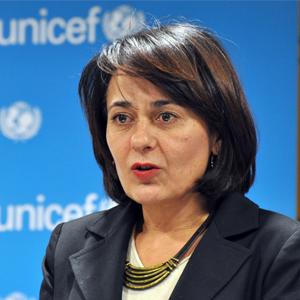Living with Autism - From the Perspective of Patients, Parents and Professionals
13 March 2017
- Early diagnosis, early interventions and inclusion in the education system, from preschool onwards, can greatly contribute to children with autistic spectrum disorders, and other developmental delays, to improve their development and quality of life, it was concluded during the symposium "Living with Autism - From the Perspective of the Patients, Parents and Professionals", held in Niš.
Niš, 13 March 2017 - Early diagnosis, early interventions and inclusion in the education system, from preschool onwards, can greatly contribute to children with autistic spectrum disorders, and other developmental delays, to improve their development and quality of life, it was concluded during the symposium "Living with Autism - From the Perspective of the Patients, Parents and Professionals", held in Niš.
The importance of early detection of symptoms of autism, causes of and new approaches in the treatment of autism spectrum disorders, the inclusion of children with autism in the preschool and school systems, and systemic support to parents were discussed at the symposium. The conference was organised by UNICEF in Serbia and the Association for Child and Adolescent Psychiatry and Allied Professions of Serbia (DEAPS), in cooperation with the Serbian Society of Autism, the Ministry of Health, Ministry of Education, Science and Technological Development, and with the active participation of Autism Speaks, the world's leading autism organisation. In addition to eminent national experts in this field, the meeting was attended by international experts, including Andy Shih from Autism Speaks, Sarah Parsons, a professor at the University Southampton in Great Britain, and Maria Luisa Scattoni from the Italian Network for Early Diagnosis of Autism Spectrum Disorders.
The delays in the timely recognition of early signs and problems of children with autistic spectrum disorders, the lack of centres for the provision of early interventions and the lack of experts in this field, are just some of the problems Serbia is facing.
In order to respond to the current challenges, the Ministry of Health has created the National Programme for the Development of Children in Early Childhood and has started its implementation.
“The adoption of the Law on Health Records foresees the establishment of a register of children with disability. With the coordination of the Public Health Institute and with the collaboration of eminent experts, the work on developing a registry has started. We expect to have the first precise and concrete information about the situation in our country by the end of 2017,” said Zlatibor Lončar, Minister of Health, at the opening of the symposium.
The Convention on the Rights of the Child and the Convention on the Rights of Persons with Disabilities obliges Serbia to ensure respect for the rights of every child, including the rights of children with disabilities.
“The better position of children with autism and other disorders, and their families, greater availability of services, ensuring the change of attitudes towards inclusiveness in society are only possible with strong political will, and with the cooperation of relevant actors in the system and financial allocations by the government,” said Michel Saint-Lot, UNICEF in Serbia Representative.
Improving conditions so that children with disabilities are able to realise their full potentials is possible only through the joint efforts of relevant ministries, professional associations and associations of persons with autism. The UNICEF in Serbia Representative stressed the importance of donations made by citizens and the private sector, such as Nordeus, which support UNICEF’s programmes in Serbia.
Living with autism can present a significant burden to families with children with autistic spectrum disorders, and they need to be provided help and assistance in a manner that will ease the daily routine of families.
“Children with autism spectrum disorders, on the one hand, in small communities have no access to services or have very limited access, and on the other, in big cities they are flooded with a range of services, many of which are not grounded in science and are not evidence based. Therefore, we need guidelines for the diagnosis, treatment and education strategies that provide additional support and help,” said Milica Pejović Milovančeviž from DEAPS.
"Our mission is to promote solutions for people with autistic spectrum disorders and their families, throughout the entire life cycle. Our main goal is the inclusion of children and persons with autism in regular life activities,” said Andy Shih from Autism Speaks.
Participants of the symposium called for the respect of the rights of every child, for the building of an inclusive society and the development and implementation of national guidelines for the early identification, diagnosis and early intervention in the area of autism.
The following day, in cooperation with international experts, discussions on professional guidance to support children with autism and their parents will commence.




